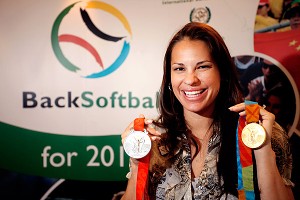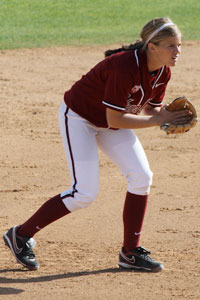Â
ORIGINAL STORY with photos - story by Graham Hays
Softball spent eight years hoping it could turn back the clock. It now needs to figure out what to do with the future.
The International Olympic Committee vote to restore wrestling to the program for 2020, at the expense of squash and a combined softball-baseball bid, did not qualify as much of a surprise. It's difficult to read the tea leaves with the IOC, as demonstrated by the uncertainty over the host city voting in the days leading up to Tokyo's win against Istanbul and Madrid. But Sunday's final tally from Buenos Aires, in which wrestling received more votes (49) than the other two bids combined (24 for softball-baseball, 22 for squash), was wholly predictable.
Sunday was a day just about anyone with a softball stake didn't want to admit they knew was coming.
It never made much sense that wrestling got the boot in the first place. Other than its omission in 1900, wrestling has been part of pretty much every Olympics anyone cared to chronicle, ancient or modern. Its various forms, including women's wrestling for the first time, drew athletes from 71 nations in 2012. A total of 29 countries won medals.
It might not generate the same kind of television ratings every four years as gymnastics, swimming, or track and field, but wrestling is about as quintessentially Olympic as a sport can get.
Wait, we were talking about softball, right? But that's kind of the point. It could partner with baseball and promise a condensed schedule, but softball was as powerless to help itself as the average Olympic batter against Cat Osterman.

Softball gold medalist Jessica Mendoza was among the athletes who took part in a presentation to the International Olympic Committee in a bid to get softball back in the Olympics.
Really, the same could be said of the original decision eight years ago to drop baseball and softball from the program after the 2008 Beijing Olympics. There was some talk about the competitive imbalance after the United States outscored opponents 51-1 en route to a gold medal in 2004, but the sport's real sin was being the women's counter to baseball at a time when Major League Baseball was simultaneously mired in the backlash against performance-enhancing drugs and unwilling to follow the NBA and NHL leads and commit its players to Olympic participation.
Baseball went. Softball was collateral damage.
Three times since then -- in 2006, 2009 and 2013 -- softball tried to persuade the IOC to take it back, either on its own merits or in a joint bid with baseball. Three times, it failed. It's not clear when the next chance will come, even if the IOC under a new president increases the number of sports it is willing to include in the program, and there is no indication any such move is imminent. We're talking a decade. Maybe more.
The reality is that the ace of the next U.S. Olympic team probably hasn't been born.
It isn't time to give up on softball returning to the Olympics, but it is long past time to stop making that the objective.
When you push all your chips to the middle of the table and the IOC doesn't even notice you're in the game, it's a sign without much subtlety. Move on.
This isn't to downplay the pain of separation. The Olympics offered softball its greatest exposure and greatest financial opportunity. Without that stage, national programs receive less funding, or no funding. Players get knocked down the pecking order of sponsors, shortening careers. That's all real. No amount of pluck or resoluteness changes the fact that Sunday was a bad day for the sport.
But these are not the end times for softball in the United States, not when an event such as the Women's College World Series continues to grow into a bigger and bigger spectacle each year. Not when the University of Alabama drew more than 5,000 people on opening day -- to a dome in Iowa in the depths of winter. Not when University of Oklahoma stars such as Keilani Ricketts and Lauren Chamberlain gained national followings as collegians that rivaled anything Lisa Fernandez, Jennie Finch or other stars of a previous generation experienced in college.
The challenge is how to keep players like Ricketts, and eventually Chamberlain, in the spotlight beyond college. The same grassroots energy that supported the bid for Olympic reinstatement would help.
"I think, here in the U.S., our energy needs to go the direction of our pro league and continue to get behind what we do have," said two-time Olympic medalist Jessica Mendoza. "As much as I want softball in the Olympics and Americans want softball in the Olympics, we have this potentially great thing that is getting very little support compared to the Olympic movement."

Former Stanford star Ashley Hansen says softball belongs on the global stage. She would've attempted a comeback for 2020 had softball been voted back in.
National Pro Fastpitch's recent championship series generated nothing close to the buzz of an Olympic final, but the games between the USSSA Pride and Chicago Bandits duplicated, and perhaps bettered, the level of play in any gold-medal game. At this point, the league doesn't even need to win over non-softball fans. Getting word of its existence out to all existing softball fans would be a start.
It is tempting to wonder whether softball might be best served by embracing its borders. It enjoys high levels of support in the United States and Japan, as well as consistent participation in Australia and Canada. Instead of using resources to try to develop interest from Italy to Indonesia, perhaps it makes more sense to do more to support programs such as the run by former Olympian Natasha Watley to teach the game in low-income areas of Los Angeles.
But if there are to be global ambitions, as Mendoza stressed there still should be, perhaps now is the time to do what wasn't pursued aggressively enough before 2005 and was pursued too hastily and haphazardly in the intervening years in a last-ditch attempt to win over IOC voters.
"It belongs on the global stage," said former Stanford star and Team USA member Ashley Hansen. "It's a sport that anyone and everyone can play; it has a low barrier to entry. So I think if we keep it local and we keep it in the United States or the regions that are already really strong in softball, we're never going to get back on that Olympic stage. I think we do belong there. I think we're an exciting sport to watch."
Hansen woke up Sunday to the news of softball's fate. Like many, she was disappointed but not surprised by the vote. In a different telling of the story, she would be the next Mendoza. Like Mendoza, she went to Stanford and emerged as arguably the best position player in college softball. Like Mendoza, Hansen is articulate, bright and charismatic. She also seemed willing to slide through broken glass to win, like Mendoza. The only active collegian on the U.S. team that won the 2010 world championship, she could have been preparing for her second Olympics in 2016 and signing autographs for girls who want to be the next her.
Instead, Hansen is getting ready for a new job with YouTube. Once finished with school in 2012, she traded in her spikes for Silicon Valley. There, she is still a role model. There just aren't as many autograph lines.
She admitted she might have tried to make a comeback had Sunday's vote gone softball's way, her competitive instincts begging her to at least try out for 2020. Not getting to see Hansen back at shortstop is just one more reason for softball fans to lament the outcome in Buenos Aires. She won't get that Olympic experience, and you had better believe it bothers her. But it doesn't stop her.
"It will definitely nag at me almost every day," Hansen said. "I wanted to be an Olympian. It was a dream kind of ripped out of my hands. But it wasn't meant to be, and I do strongly believe that. For me personally, I missed out on this opportunity, but maybe it's for a bigger purpose. Maybe it's to provide that opportunity to a lot more girls in the future. Maybe it's to establish myself as a professional outside of softball.
"Whatever that situation may be, I know that I'm still OK without being on the Olympic stage."
In her own way, then, she is this softball generation's Mendoza. Following Hansen's lead is softball's best path to future Olympics.
It won't be a short or an easy hike. But at least it will be forward.
After Sunday, there is no going back.